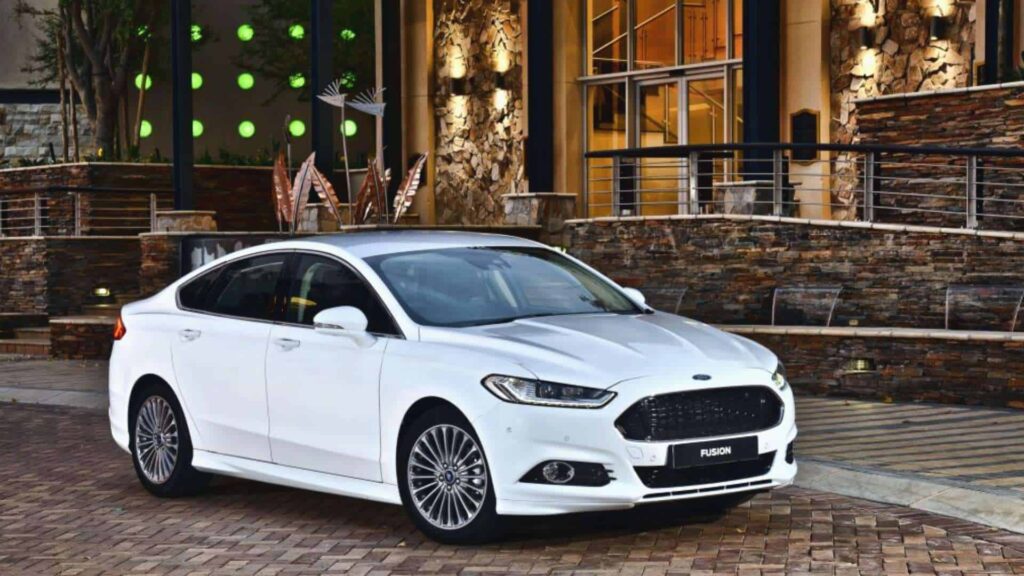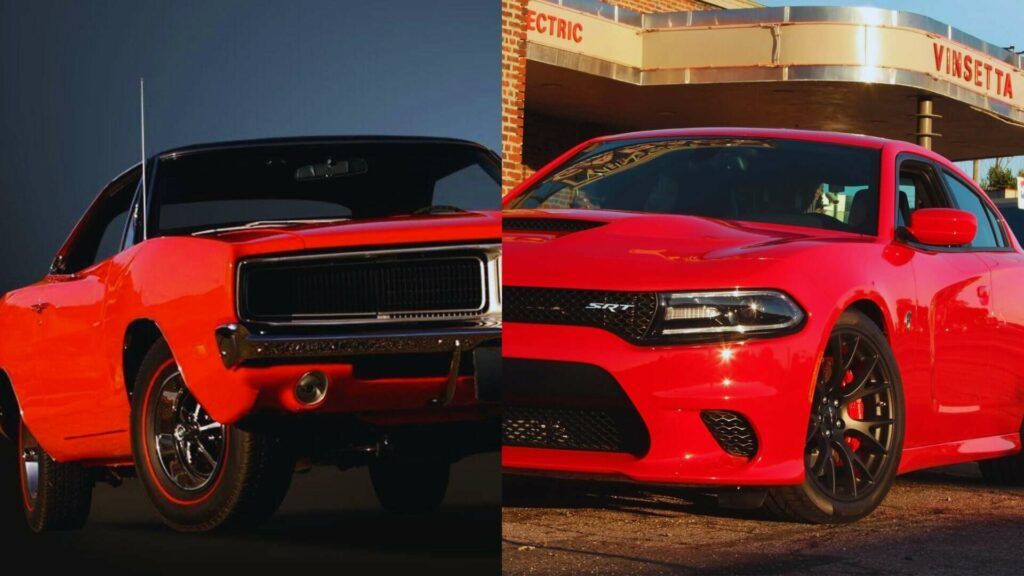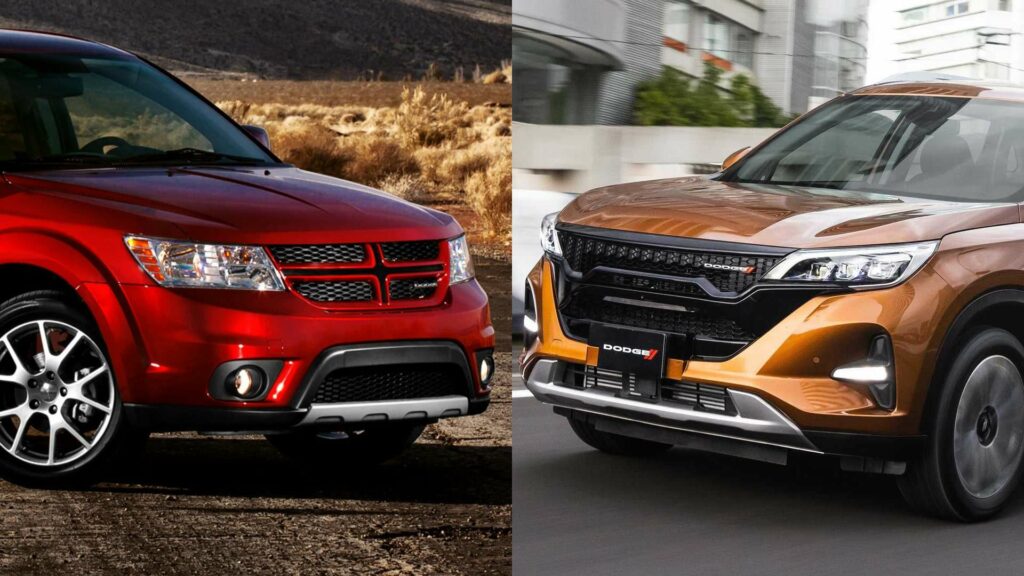When it comes to figuring out what kind of gas or fuel a certain vehicle should take, then we’re definitely no strangers to the topic. Thus, we’ve created a specific guide for the type of gas that the Ford Fusion takes!
This will be quite a useful read for all soon-to-be Ford Fusion owners out there so that they don’t end up filling up their vehicles with the wrong gas type and causing engine issues.
If you want to compare the Ford Fusion’s gas type with that of other vehicles, be sure to check out our other gas type articles for the Ford Explorer and even the Chevy Silverado!
Other than that, let’s start by first answering the main question below.
What kind of gas does a Ford Fusion take?
All Ford Fusion generations (2006 to 2020) require regular unleaded gasoline with a minimum octane rating of 87.
2010 to 2012 Ford Fusion models with the 3-liter Duratec V6 are also flex-fuel capable and can take gasoline blended with up to 85% ethanol (E85).
The two generations of the Ford Fusion require at least 87-octane unleaded gasoline in their systems in order to run properly.
This means that any gasoline that’s rated below 87 should be avoided, as the Ford Fusion’s engine is not designed to work with lower octane fuel and may result in premature ignition and engine knock.

It’s also worth noting that there are some specific model years of the Ford Fusion that can actually take some amount of ethanol content in their usual gasoline.
Ford Fusion models made from 2010 to 2012 had a 3-liter Duratec V6 engine option that had a flex-fuel system, which means that they can actually take up to 85% ethanol or E85 in their gas tank.

While there are still other Ford Fusion model years that can take gasoline-ethanol blends, they were nowhere near the level of capability that the 2010 to 2012 models had with their flex-fuel systems.
We’ll be discussing the fuel requirements of each Ford Fusion model in more detail in the next part.
Ford Fusion Fuel Requirements Based on Generation and Engine Type
All Ford Fusion generations need a minimum of 87-octane (regular) unleaded gasoline for both their hybrid and non-hybrid engine options.
Unless capable of using flex-fuel, use only gasoline with up to 10% ethanol for Ford Fusion models from 2007 to 2012 and up to 15% for those from 2013 to 2020.
1st-Generation Ford Fusion (CD3) (2006 to 2012)

| Engine Option | Minimum Fuel Requirement |
| 2.3L Duratec 23 I4 | 87-Octane Unleaded Gasoline (Regular) (E10 Capable for 2007 to 2012 models) |
| 2.5L Duratec 25 I4 | 87-Octane Unleaded Gasoline (Regular)(E10 Capable for 2007 to 2012 models) |
3.0L Duratec 30 V6 | 87-Octane Unleaded Gasoline (Regular) (Flex-Fuel/E85 Capable for 2010 to 2012 Models) |
| 3.5L Duratec 35 V6 | 87-Octane Unleaded Gasoline (Regular)(E10 Capable for 2007 to 2012 models) |
All 1st-generation Ford Fusion models from 2006 to 2012 require a minimum of 87-octane unleaded gasoline in order to avoid engine knock.
Furthermore, all engine options under this generation are also compatible with ethanol, except for the 2006 model year.
However, the 2.3-liter I4, 2.5-liter I4, and 3.5-liter V6 Duratec engines are all limited to only a 10% ethanol blend specifically, also known as E10 (10% ethanol and 90% gasoline).
The 3-liter Duratec 30 V6 from 2010 to 2012, on the other hand, is flex-fuel capable and is the only Ford Fusion that can take as much as 85% ethanol content in its gasoline (E85).
Thus, this makes the 2010 to 2012 model powered by the 3-liter V6 engine option the only Ford Fusion that can be classified as an FFV (Flex-Fuel Vehicle).
2nd-Generation Ford Fusion (CD4) (2013 to 2020)

| Engine Option | Minimum Fuel Requirement |
| 1.5L EcoBoost I4 | 87-Octane Unleaded Gasoline (Regular) (E15 Capable) |
| 1.6L EcoBoost I4 | 87-Octane Unleaded Gasoline (Regular)(E15 Capable) |
| 2.0L EcoBoost I4 | 87-Octane Unleaded Gasoline (Regular)(E15 Capable) |
| 2.0L Duratec I4 (Hybrid Trim) | 87-Octane Unleaded Gasoline (Regular)(E15 Capable) |
| 2.5L Duratec I4 | 87-Octane Unleaded Gasoline (Regular)(E15 Capable) |
| 2.7L EcoBoost V6 (Sport Trim) | 87-Octane Unleaded Gasoline (Regular)(E15 Capable) |
When the 2nd-generation Ford Fusion “CD4” started its model year run in 2013, it introduced two big changes to the table as far as this article’s topic is concerned.
These two changes were a new set of engine options and a higher 15% ethanol (E15) capability for just about every single one of them.
Also, let’s not forget that the 2nd-generation Fusion still requires a minimum of 87-octane unleaded gasoline just like its predecessor did.
But unlike the 1st-generation Ford Fusion “CD3”, the 2nd generation did not offer a flex-fuel-capable model, as 2012 was the last model year that an FFV Ford Fusion was made.
Types of Gasoline/Fuel That Can Be Used in a Ford Fusion
The Ford Fusion can use TOP TIER gasoline, which is recommended by Ford and other major automakers due to its high-quality engine-cleaning additives.
The Fusion can also be filled up with reformulated gasoline, as it burns cleaner and produces less toxic emissions compared to conventional gasoline.
TOP TIER Gasoline (Ford’s Recommendation)
TOP TIER gasoline brands have been multiplying ever since it was developed in 2004 and for a good reason.

Unlike other types of gasoline that contain additives that can have negative effects on your engine and fuel system, TOP TIER gasoline contains carefully formulated detergent additives that are produced to high standards.
Thanks to such detergent additives, TOP TIER gasoline is able to clean the engine and protect it against the accumulation of deposits, debris, or any sort of gunk.
This has propelled the TOP TIER formula to be adopted by over 60 gasoline brands across the US and Canada.
Even though the Ford Fusion doesn’t have a diesel variant, it’s still worth mentioning that there are actually 2 diesel brands that sell TOP TIER diesel fuel.
Because of its popularity and safe engine-cleaning capability, Ford and lots of other major automobile manufacturers recommend the use of TOP TIER gasoline in their vehicles.
Spotting a fuel brand produced according to TOP TIER standards is pretty simple, as all you need to do is look for the labels on the fuel pumps, as shown below.

Reformulated Gasoline (RFG)
If you’re unable to find any TOP TIER gasoline around your area, then you can also consider filling up your Ford Fusion with reformulated gasoline, another clean and more modern choice of fuel.
Reformulated gasoline is known for its less toxic and carefully-formulated mixture, and its main selling point is that it burns cleaner than conventional gasoline.
As a result, vehicles using reformulated gasoline produce lesser carbon emissions, which works in favor of those living in areas where there’s a higher concentration of smog or air pollution.
Though there’s no mention of brands that are specifically recommending reformulated gasoline for their vehicles, it’s still mandated by the US Congress in the Clean Air Act amendments of 1990.
Furthermore, according to the US Environmental Protection Agency, reformulated gasoline is currently used in 16 US states and the District of Columbia, which translates to about 25% of all gasoline sold in the US being reformulated gasoline.
With that said, you cannot go wrong with using reformulated gasoline in your vehicle, just as long as you avoid some specific ingredients that we’re going to be discussing in the next part.
Types of Gasoline/Fuel to Avoid for the Ford Fusion
Do not fill up the Ford Fusion with any oxygenated blends, such as ethanol blends, unless it has been indicated to be capable of using flex-fuel, E10, or E15.
The Ford Fusion should not be filled up with gasoline with MMT, gasoline with metallic or silicon-based additives, and diesel or biodiesel.
Oxygenated Blends or Flex-Fuel/E85 (Depends on Model Year)
Oxygenated blends or flex-fuel are part of this “to avoid” list not because you should avoid all of them entirely, but because there are certain Ford Fusion models that are either not compatible or only compatible with them up to a certain point.
To start, all 2006 Ford Fusion models are not compatible with any kind of oxygenated blends, which means that you should definitely avoid E85 or any sort of gasoline with ethanol.
Accidentally putting in gasoline with ethanol or any sort of “oxygenates” can corrode your internals and fuel system on a vehicle with an engine that wasn’t built to take it.
This is because ethanol tends to make gasoline absorb more water, which can have corrosive effects on the metallic components of an engine.
However, there are still some Ford Fusion model years that are actually compatible with ethanol.
2007 to 2012 Ford Fusion models can use gasoline with up to 10% ethanol, whereas 2013 to 2020 models can use up to 15% ethanol.
2010 to 2012 models with the 3-liter Duratec V6 are flex-fuel capable and can use as much as 85% ethanol (E85).
Aside from taking note of the specific model years we’ve mentioned above, you can also simply check the gas cap of the Ford Fusion for details regarding its compatibility with ethanol.
If it’s E10 or E15-capable, it will have a black cap with either “E10” or “E15” written on it. Otherwise, it will be yellow if it’s flex-fuel or E85-capable.

Gasoline with MMT (Methylcyclopentadienyl Manganese Tricarbonyl)
One type of gasoline that is definitely not recommended for the Ford Fusion and countless other vehicle models is gasoline with MMT.
MMT is a metallic-based additive, and its main purpose is to boost the octane rating of leaded and even unleaded gasoline across the US and Canada.
While MMT may be deemed useful for reducing the chances of engine knocking, it still has one big downside in the form of being more negatively impacting on the environment.
Adding MMT to gasoline is known to make your emissions more toxic and also cause damage to both the spark plugs and the emissions system.
Thus, many different gasoline brands do not include MMT in their gasoline anymore. As such, neither Ford nor any other major vehicle manufacturer recommends using it.

Gasoline with Added Materials (Metallic or Silicon-Based Additives)
Gasoline sold in the market today can contain many different types of additives, but not all of them are completely “safe” or risk-free for certain vehicle types.
In the case of the Ford Fusion, gasoline that contains added materials such as metallic or silicon-based additives should not be used to fill it up, and this applies to every single model year.
If you were to use gasoline with any sort of additives, then it’s best to just turn to TOP TIER gasoline with its mixture of engine-cleaning detergent additives.
Not only does it save you the effort of buying separate additives and pouring them into your gas tank yourself, but you can also be sure that it’s carefully formulated up to high fuel industry standards.
Diesel/Biodiesel
This particular entry on this list of gas types to avoid also serves as a reminder that the Ford Fusion doesn’t have a diesel engine option. So that simply means that you shouldn’t put diesel or biodiesel in it.
Though it’s relatively common for new car owners to accidentally put diesel in their gasoline cars, this can simply be avoided by looking at the color and label of the fuel pump you’re going to grab.
Diesel or biodiesel pumps will usually be green in color, and even if they aren’t, they would still be labeled accordingly either on the machine or on the nozzle itself.

Putting diesel in a gasoline engine will cause the spark plugs and fuel system to clog up, as diesel is thicker and denser than gasoline.
What will happen if I used the wrong gas type?
Using the wrong gas type, such as one with a lower octane rating than what your vehicle requires, can decrease performance, cause engine knock, and damage the internals.
When you put diesel in a gasoline engine, the spark plugs and fuel system will get clogged, as diesel is thicker than gasoline.
Ford Fusion Gas Mileage Per Generation
1st-Generation Ford Fusion (2006 to 2012)
| Trim Level | Lowest Combined MPG | Highest Combined MPG |
| Fusion S FWD (I4) | 23 | 31 |
| Fusion SE FWD (I4) | 23 | 31 |
| Fusion SEL FWD (I4) | 23 | 31 |
| Fusion SE FWD (V6) | 20 | 28 |
| Fusion SEL FWD (V6) | 20 | 28 |
| Fusion SE AWD (V6) | 19 | 26 |
| Fusion SEL AWD (V6) | 19 | 26 |
2nd-Generation Ford Fusion (2013 to 2020)
| Trim Level | Lowest Combined MPG | Highest Combined MPG |
| Fusion S FWD | 22 | 34 |
| Fusion SE FWD | 22 | 34 |
| Fusion SE AWD | 20 | 29 |
| Fusion SEL FWD | 23 | 34 |
| Fusion Titanium FWD | 22 | 33 |
| Fusion Titanium AWD | 22 | 31 |
Ford Fusion Hybrid (2010 to 2020)
| Trim Level | City MPG | Highway MPG |
| Fusion Hybrid SE FWD | 44 | 41 |
| Fusion Hybrid SEL FWD | 43 | 41 |
| Fusion Hybrid Titanium FWD | 44 | 41 |
Ford Fusion Energi Plug-In Hybrid (PHEV) (2013 to 2020)
| Trim Level | Combined MPG(Hybrid Mode) | Combined MPG-e (All-Electric Mode) |
| Fusion Energi SE Luxury | 38 | 88 (gasoline equivalent) |
| Fusion Energi Titanium | 38 | 88 (gasoline equivalent) |
Frequently Asked Questions (FAQs)
Why do I hear a knocking noise from the engine after refueling?
If your engine is making knocking sounds after refueling, then you may have either used the wrong type of fuel or the fuel is contaminated.
However, there are other issues, such as incorrect air-fuel ratio and ignition timing, that can cause engine knock, so make sure to bring your car to a mechanic.
What is the gas tank size of the Ford Fusion?
The Ford Fusion has a gas tank size/capacity starting from 16.5 US gallons (62.4 liters) to 18 US gallons (68.1 liters) depending on the generation and engine option.
The Ford Fusion Hybrid and Fusion Energi models have a gas tank size/capacity of 14 US gallons (53 liters).
| Ford Fusion Generation | Engine Option | Gas Tank Size/Capacity (US Gallon) |
| 1st Generation (2006 to 2012) | 2.3L Duratec 23 I4 (FWD) | 17.5 gal (66.2 l) |
| 2.3L Duratec 23 I4 (AWD) | 16.5 gal (62.4 l) | |
| 2.5L Duratec 25 I4 (FWD) | 17.5 gal (66.2 l) | |
| 2.5L Duratec 25 I4 (AWD) | 16.5 gal (62.4 l) | |
| 3.0L Duratec 30 V6 (FWD) | 17.5 gal (66.2 l) | |
| 3.0L Duratec 30 V6 (AWD) | 16.5 gal (62.4 l) | |
| 3.5L Duratec 35 V6 (FWD) | 17.5 gal (66.2 l) | |
| 3.5L Duratec 35 V6 (AWD) | 16.5 gal (62.4 l) | |
| 2nd Generation (2013 to 2020) | 1.5L EcoBoost I4 (FWD) | 16.5 gal (62.4 l) |
| 1.5L EcoBoost I4 (AWD) | 17.5 gal (66.2 l) | |
| 1.6L EcoBoost I4 (FWD) | 16.5 gal (62.4 l) | |
| 1.6L EcoBoost I4 (AWD) | 17.5 gal (66.2 l) | |
| 2.0L EcoBoost I4 (FWD) | 16.5 gal (62.4 l) | |
| 2.0L EcoBoost I4 (AWD) | 17.5 gal (66.2 l) | |
| 2.5L Duratec I4 (FWD) | 16.5 gal (62.4 l) | |
| 2.5L Duratec I4 (AWD) | ||
| 2.7L EcoBoost V6 (Sport Only) | 18 gal (68.1 l) | |
| Ford Fusion Hybrid (1st Generation) (2010 to 2012) | Gasoline Engine: 2.5L Duratec 25 Atkinson-Cycle I4 Electric Motor: Permanent Magnet AC Synchronous Motor | 14 gal (53 l) (Gasoline Engine) |
| Ford Fusion Hybrid (2nd Generation) (2013 to 2020) | Gasoline Engine: 2.0L Duratec 20 Atkinson-Cycle I4 Electric Motor: Permanent Magnet AC Synchronous Motor | 14 gal (53 l) (Gasoline Engine) |
| Ford Fusion Energi Plug-In Hybrid (PHEV) | Gasoline Engine: 2.0L Duratec 20 Atkinson-Cycle I4 Electric Motor: 88-kW Electric Motor With 7.6-kWh Lithium-Ion Battery | 14 gal (53 l) (Gasoline Engine) |
How much does it cost to fill up a Ford Fusion?
Using the US average regular gas price of $3.392 per gallon, it will cost about $56 to fill up a Ford Fusion with the smallest gas tank size (16.5 gal).
Filling up a Ford Fusion with the biggest gas tank size (18 gal) will cost you about $61.1, while Hybrid and Energi models (14 gal) will cost $47.5.




